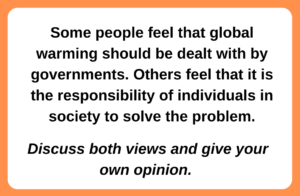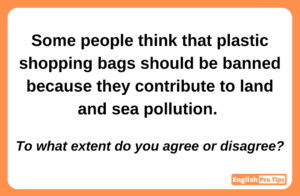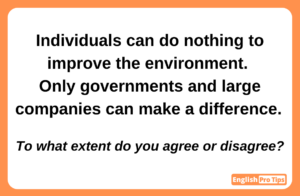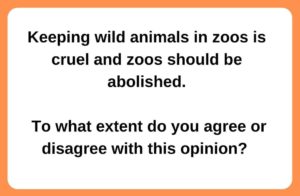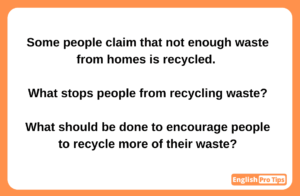IELTS Vocabulary Course
-
Course Outline and Content
-
How to Increase your Vocabulary
-
People and Community
Describing People -
Upbringing and Family
-
Health and Happiness
-
Roles and Responsibility
-
Crime
-
Revision: People and Community
-
Geography and The EnvironmentBuildings and Cities
-
The Environment
-
Travel
-
Nature and Wildlife
-
Assessing Efforts
-
Revision: Geography and The Environment
-
Education, Technology and SkillsSkills and learning
-
Education
-
Work
-
Economy
-
Technology
-
Revision: Education, Technology and Skills
-
End of the CourseEnd of the Vocabulary Course, what's next...
The Environment
- 20 minutes
Slow video loading? View the Alternative Video Source
Word list (25 words)
Click on the words for the meaning, example sentences, collocation, and other forms of the word.
Single-use (adjective)
Used to refer to a product that can be used once and is then thrown away.
Individuals should limit their use of single-use packaging.
- Single use + bottles/ bags/ plastics/ containers
Landfill (noun: countable + uncountable)
A place where garbage is buried.
Landfill is not an acceptable method of waste disposal.
- Landfill + site
Reuse (verb)
To use something again.
Nowadays, customers often reuse shopping bags.
- Reuse + bags/ bottles/ containers
Reusable (adjective): Some shops encourage people to bring reusable bags from home.
Sustainable (adjective)
Able to be maintained or continued.
Promoting economic growth is often at odds with maintaining a sustainable environment.
- Sustainable + growth/ environment/ use/ development
Sustain (verb): It is important that the government sustain efforts to protect the environment.
Sustainability (noun: uncountable): Not all governments are meeting their sustainability commitments.
Conserve (verb)
To keep and protect from waste, loss, or damage.
We can insulate our houses to conserve heat.
- conserve + water/ heat/ fuel/ energy
Conservation (noun)- The university is saving $300,000 per year through its energy conservation efforts.
Recycle (verb)
To convert used material into material that can be used again.
It’s important for schools to recycle all of the paper that they use.
- Recycle + products/ goods/ material
Recyclable (adjective): Consumers should put pressure on companies to use recyclable packaging.
Waste (noun: countable + uncountable)
Unwanted material left after use.
Governments should also be looking into alternative forms of waste disposal.
- waste + disposal
- harmful/ hazardous/ food + waste
Waste (verb)- It is common for people to waste food.
Renewable (adjective)
Substances or products that can be used and easily replaced. Common types of renewable energy are: solar energy- from the sun, wind energy- from the wind, hydroelectric energy- from dams
Governments should be investing in renewable energy sources such as wind and solar power.
- Renewable + energy/ resources
Renew (verb): The government renewed its effort to protect the rainforest.
Carbon (dioxide) emissions (noun: plural)
Carbon dioxide that planes, cars, factories, etc. produce, which is harmful to the environment.
We all need to do more to reduce carbon emissions.
Carbon footprint (noun: countable)
Someone’s carbon footprint is a measurement of the amount of carbon dioxide that their activities produce.
There are simple things that individuals can do to reduce their carbon footprint: reduce their electricity and gas usage, and take fewer airplane trips.
- reduce/ increase/ create/ leave + carbon footprint
Fossil fuels (noun: countable)
A fuel such as gas, coal, and oil that has been produced in the earth and often burned to produce energy.
Many countries are hoping to reduce their reliance on fossil fuels as a source of energy.
- be reliant on/ decrease reliance on + fossil fuels
Global warming (noun: uncountable)
A gradual increase in the earth’s temperature, caused by gasses, especially carbon dioxide, surrounding the earth.
Scientists fear that global warming has gone beyond the point of no return.
Greenhouse effect (noun: countable)
When heat from the earth is prevented from escaping into space.
Scientists claim that increased flooding is a result of the greenhouse effect.
Greenhouse + effect/ gas/ gas emissions
Ozone layer (noun: uncountable)
A layer of oxygen above the earth that protects the earth from the sun’s ultraviolet light.
Our increasing use of harmful gasses is contributing to the depletion of the ozone layer.
- depletion of/ deterioration of + the ozone layer
Methane (noun: uncountable)
A greenhouse gas, like carbon dioxide, which is used as fuel to produce energy.
Governments should limit their use of greenhouse gasses such as carbon dioxide and methane.
Deforestation (noun: uncountable)
The cutting down of trees in a large area, or the destruction of forests by people.
Deforestation is destroying large areas of tropical rainforest.
Deforest (verb): Companies have deforested large areas of the Amazon rainforest.
Extinct (adjective)
No longer existing.
There is concern that the giant panda will soon become extinct.
- extinct + species
- in danger of becoming/ on the verge of becoming + extinct
Extinction (noun: uncountable): Many plant and animal species are in danger of extinction.
Ecosystem (noun: countable)
All the plants, animals, and people living in an area considered together with their environment as a system of relationships.
They are working to preserve the delicately balanced ecosystem of these wetlands.
- balanced/ marine + ecosystem
Biodiversity (noun: uncountable)
The number and types of plants and animals that exist in a particular area or in the world generally.
International organisations are trying to protect the biodiversity that exists in the Amazon rainforest.
Biodiverse (adjective): Priority should go to protecting biodiverse natural areas.
Degradation (noun: uncountable)
The process in which the beauty or quality of something is destroyed or spoiled.
Especially since the industrial revolution, many species have become extinct due to environmental degradation caused by human activity.
- environmental/ soil + degradation.
- degradation + of (something/somewhere)
Degrade (verb): Every day, the environment is further degraded by toxic waste.
The food chain (noun: uncountable)
A series of living things in which each group eats organisms from the group lower than itself in the series.
Humans have long been at the top of the food chain.
- bottom of/ top of + food chain
Biodegradable (adjective)
A substance which is able to decay naturally without harming the environment.
Many supermarkets now use biodegradable bags instead of plastic bags.
- biodegradable + bags/ products
Biodegrade (verb)- Some plastics are designed to biodegrade.
Decompose (verb)
To destroy something by breaking it into smaller parts.
Waste in landfill sites will take a long time to decompose.
Decomposition (noun)- Decomposition is the process by which organic substances are broken down into simpler organic matter.
Hazardous (adjective)
Dangerous.
It is important that workers are properly protected when doing hazardous work.
- hazardous + waste/ material/ substance/ chemical
Hazard (noun: countable): The busy traffic was a hazard to pedestrians.
Contamination (noun: uncountable)
The process of making something dirty or poisonous.
Power plants are often responsible for the contamination of their immediate surroundings.
- avoid/ prevent/ possible/ radioactive/ risk of/ source of + contamination
Contaminate (verb): Companies should be responsible for the natural land that they contaminate.
- –
- The Half-Striped Quagga
- Natural gas
- Coal, oil, and natural gas
- Water vapour, carbon dioxide and methane
- Rubber shoes
- Heating your home every day using fossil fuel energy sources.
- Plastic bags
- Population growth
- –
Personalise the vocabulary
A proven way to learn vocabulary is to personalise it. Type your answers into this form and print it off as study material. You can also practice these IELTS style questions with a partner. You can only save and print your answers if you do this activity on a computer (not a mobile phone). You will not get tutor feedback on your answers. This activity is simply for you to practice the vocabulary.


